PENGUIN  CLASSICS
CLASSICS
THE ROPE
AND OTHER PLAYS
ADVISORY EDITOR: BETTY RADICE
T ITUS M ACCIUS P LAUTUS was born in Sarsina, Umbria, in about 254 B.C. , and was originally named, after his father, Titus. Little is known of his life, but it is believed that he went to Rome when young and worked as a stage assistant. His potential as an actor was discovered and he acquired two other names: Maccius, derived perhaps from the name of a clown in popular farce, and Plautus, a cognomen meaning flat-footed.
Somehow Plautus saved enough capital to go into business as a merchant shipper, but this venture collapsed, and he worked (says the tradition) as a millers labourer, and in his spare time studied Greek drama. From the age of forty onwards he achieved increasing success as an adaptor of Greek comedies for the Roman stage. Much of his work seems to be original, however, and not mere translation. He was rewarded by being granted Roman citizenship. According to Cicero he died in 184 B.C.
E. F. W ATLING was educated at Christs Hospital and University College, Oxford. His translations of Greek and Roman plays for the Penguin Classics include the seven plays of Sophocles, nine plays of Plautus, and a selection of the tragedies of Seneca. He died in 1990.
PLAUTUS
_______________________________
THE GHOST
THE ROPE
A THREE-DOLLAR DAY
AMPHITRYO
TRANSLATED BY
E. F. WATLING
PENGUIN BOOKS
PENGUIN BOOKS
Published by the Penguin Group
Penguin Books Ltd, 80 Strand, London WC2R 0RL , England
Penguin Putnam Inc., 375 Hudson Street, New York. New York 10014, USA
Penguin Books Australia Ltd, 250 Camberwell Road, Camberwell, Victoria 3124, Australia
Penguin Books Canada Ltd, 10 Alcorn Avenue, Toronto, Ontario, Canada M4V 3B2
Penguin Books India (P) Ltd, 11 Community Centre, Panchsheel Park. New Delhi 110017, India
Penguin Books (NZ) Ltd, Cnr Rosedale and Airborne Roads, Albany, Auckland. New Zealand
Penguin Books (South Africa) (Pty) Ltd, 24 Sturdee Avenue, Rosebank 2196, South Africa
Penguin Books Ltd, Registered Offices: 80 Strand, London WC2R 0RL , England
www.penguin.com
This translation first published 1964
26
Copyright E. F. Watting, 1964
All rights reserved
The terms for performances of these plays
may be obtained from the Society of
Authors, 84 Drayton Gardens, London
SW10 9SD, to whom any applications for
permission should be made
Except in the United States of America, this book is sold subject
to the condition that it shall not, by way of trade or otherwise, be lent,
re-sold, hired out, or otherwise circulated without the publishers
prior consent in any form of binding or cover other than that in
which it is published and without a similar condition including this
condition being imposed on the subsequent purchaser
978-0-14-193791-5
CONTENTS
INTRODUCTION
T HE comedies of Plautus are the earliest complete works of Latin literature that we possess; and we possess them virtually in the form in which they were collected and edited a little more than a century after his death; the twenty plays, and a fragment of a twenty-first, are with little doubt those selected as genuine by the critic M. Terentius Varro out of a large body of imitative or contaminated work. Already in his lifetime and shortly afterwards the name of Plautus was a hallmark which his competitors were anxious to attach to any productions which could claim even a partial relationship to the master.
The volume and completeness of the extant work, and the brightness of the image which it presents of a single and original genius, make all the more remarkable, and regrettable, the scantiness of the available evidence outside the works themselves as to the personal life of the author, the sources and method of his work, and the theatrical conditions for which he worked. His name itself is a matter of doubt, but has been explained as follows. Titus, the son of a similarly named father, was born in the Umbrian town of Sarsina about 254 B.C. Coming at an early age to seek his livelihood in Rome, he was employed as a stage assistant to a company of players, and soon discovered a talent for acting. He had already acquired, after the Italian custom, a second name derived from a physical peculiarity: Plautus, the flat- or broad-footed man. His success in the playing of stock comic parts led to his being dubbed with the name of one of them Maccus, the clown of popular farce. By some means or other he saved sufficient capital to leave the stage and go into business as a merchant shipper, but this venture rapidly collapsed and left him again out of work. He was unable or unwilling to resume his theatrical connexion or if he did he filled in his time between engagements by working as a millers labourer. In any case, what time he could spare from milling or acting he employed to good purpose in studying Greek drama, and from about his fortieth year he became increasingly successful and famous as an adaptor of Greek comedies for the Roman stage. When the time came for him to be acknowledged and rewarded by the privilege of Roman citizenship, it was necessary for Titus Flatfoot the Clown to assume a formal praenomen, nomen, and cognomen, and he became TITUS MACCIUS PLAUTUS . As there was in fact a gens Maccia, his adoption into this clan was convenient and appropriate. Whether his name was in fact Maccus or Maccius has always been uncertain (owing to the ambiguity of the genitive case Macci cited with the titles of his plays), and indeed for some centuries a misinterpretation of the literary evidence led to his being known as M. Accius Plautus.
This and the date of his death, 184 B.C. , according to Cicero is all that the extant tradition can tell us; and clearly it amounts to little more than might have been guessed or invented about a figure notable in his own day but of whom no tangible record other than his written work was ever preserved. Meagre as it is, the tradition even raises doubts as to its own accuracy. Could the profession of acting, or stage-management, in the early years of his life, have been a young mans only gainful occupation, or one likely to lead to an early and affluent retirement? The theatre was nothing like an established full-time industry in Rome at that date; plays were commissioned for certain periodical festivals and acted on a single day or for a short series of days; as far as our evidence goes, it would seem that the licensed occasions for play-acting ( ludi scaenici ) before 200 B.C. probably did not amount to more than ten days in the year.
We have, of course, no idea in what circumstances Plautus left his native town. He may have been already in possession of some patrimony, or may even have been a slave and thus (it has been suggested) introduced to Greek language and literature in the capacity of favoured pupil of some cultivated master. Stage actors were, in any case, in a sense slaves, if not always strictly in that category; subject at least, as long as they chose to put up with it, to the absolute control of their employer, and subject to dire penalties for incompetence or slackness in their craft (the whip for anyone who has made a mistake, and a drink for those who havent is the prospect looked forward to by the actors speaking the epilogue in Cistellaria ). It is difficult to resist seeing some connexion between this fact the slavery of actors and Plautuss close association with their class and the brilliantly vivacious portrayal of the slave characters in his comedies. He drew the accepted comic types the old men gullible, irascible, or lecherous the young men lovelorn and usually prodigal the maidens virtuous, the matrons formidable, and the courtesans professionally seductive on conventional lines, though not without individual subtleties. But his slaves are never mere conventional types or incidental adjuncts to the cast; they are the instigators and pivots of most of the comic intrigues, and each one of them, down to the smallest bit-player, springs to life with an individual and irresistible spontaneity. If we had to point to one particular feature of Plautine comedy that bears the clearest mark of indigenous and original invention, it would surely be the impudent, the indispensable, the endlessly resourceful, the badgered, bullied, and beaten, but ever coming-up-smiling Plautine slave.
Next page
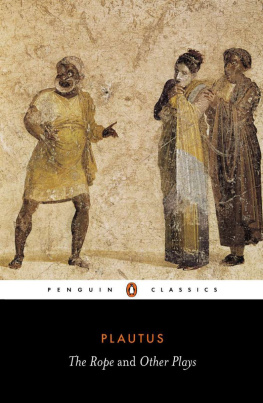
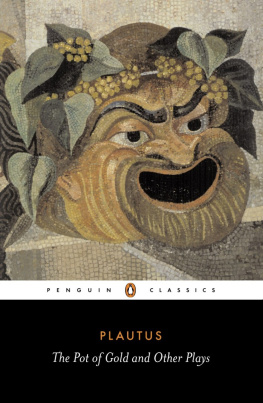
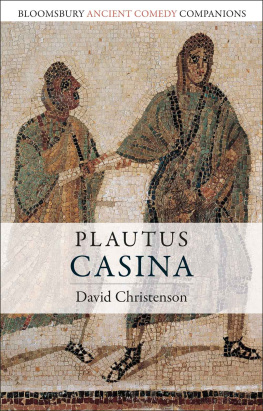
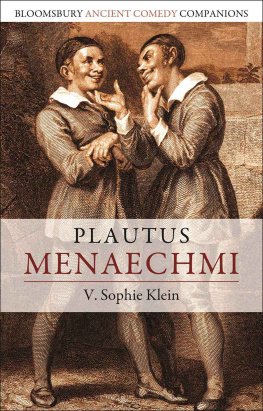
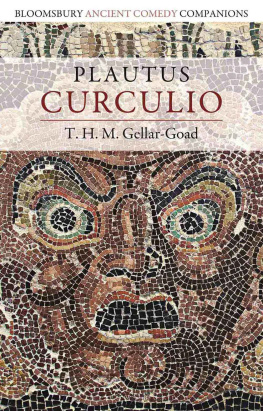
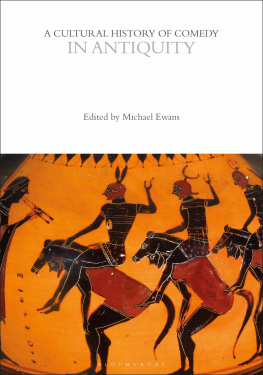




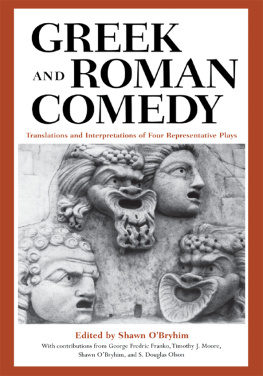


 CLASSICS
CLASSICS